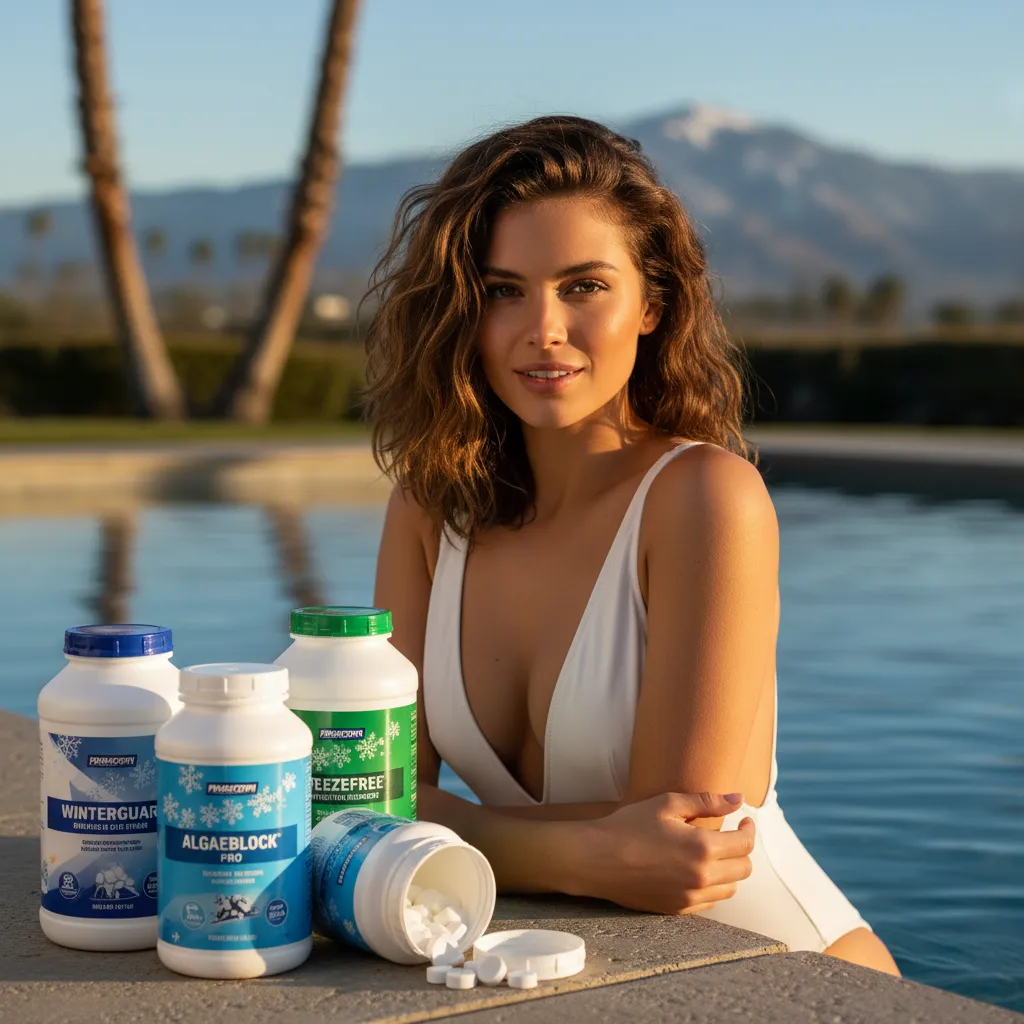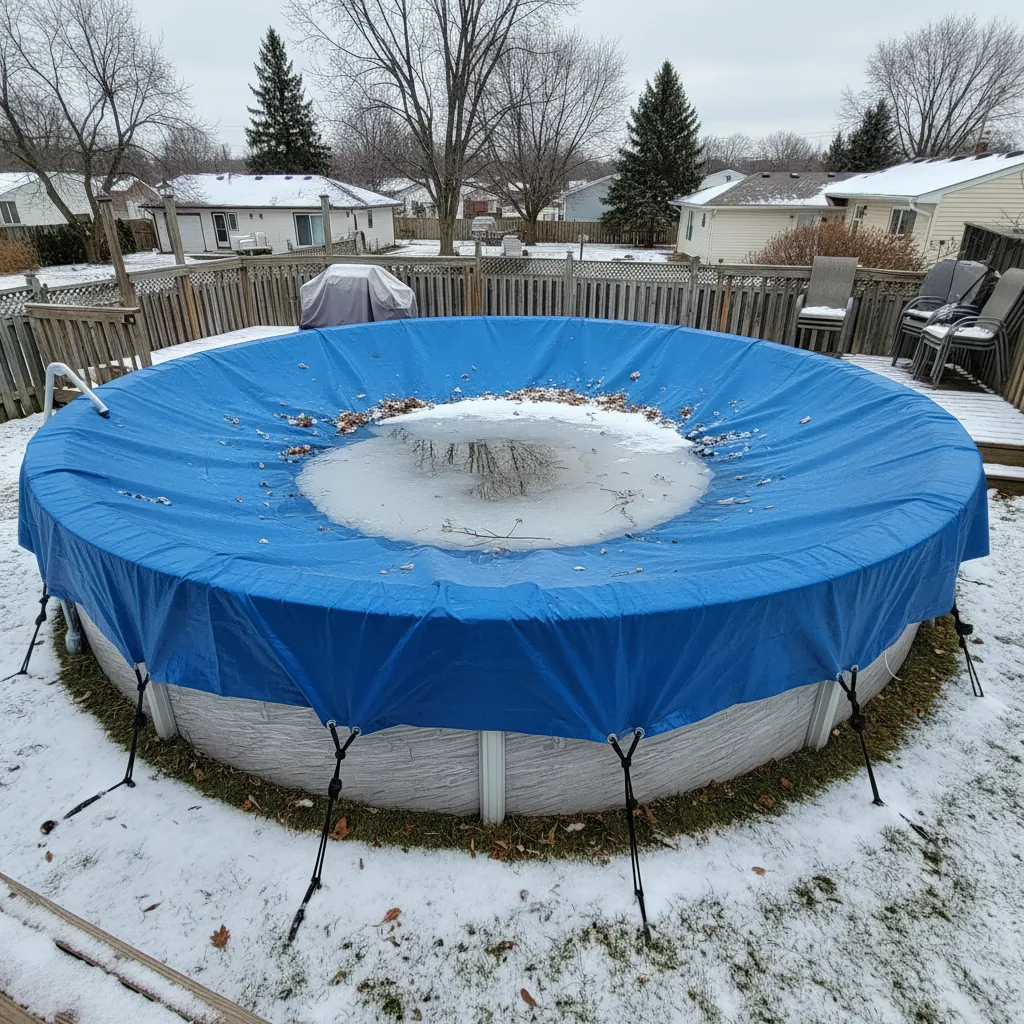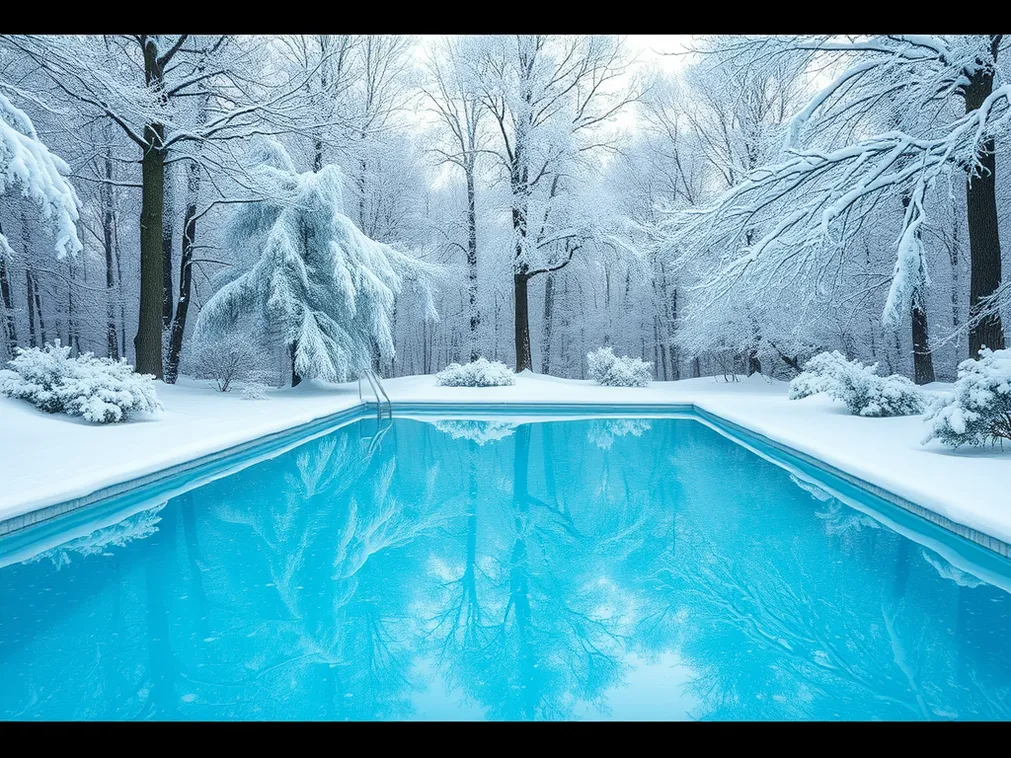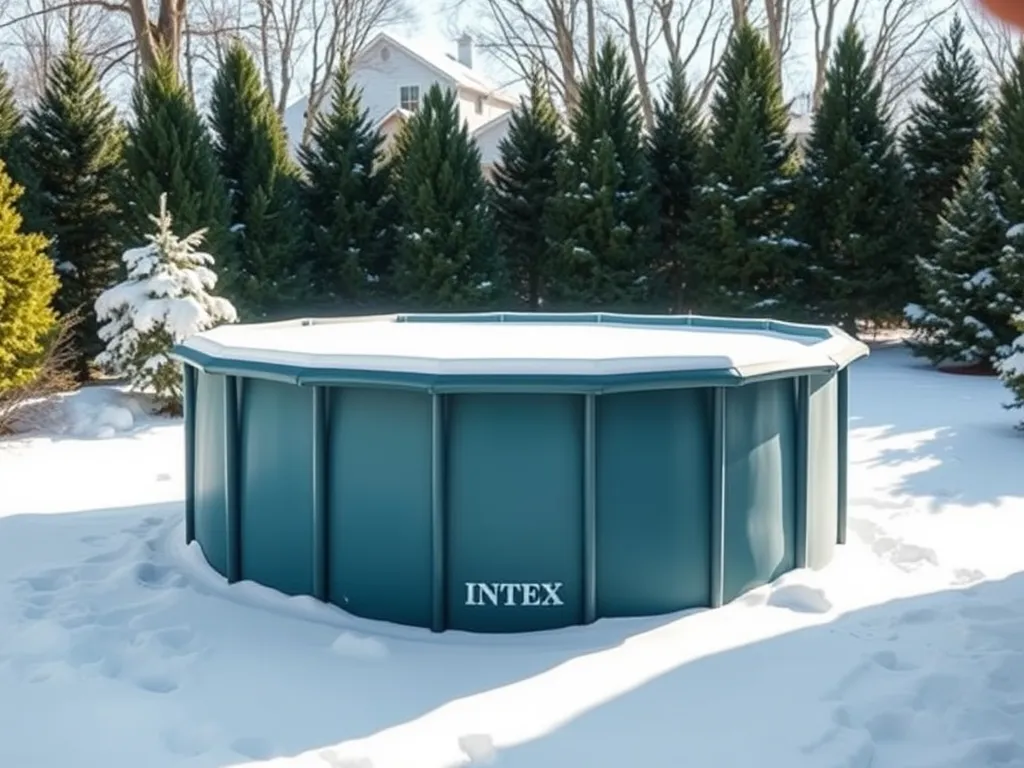Can You Use RV Antifreeze in a Pool? A Pool Care Guide
Published on: November 21, 2025 | Last Updated: November 17, 2025
Written By: Marcus Thornfield
Using RV antifreeze in a pool isn’t safe. While both RV and pool antifreeze use propylene glycol (PG), RV formulas contain additives toxic to swimmers and harmful to pool systems. Pool-specific antifreeze is non-toxic, NSF-certified, and designed to protect plumbing without risking water contamination. Before considering RV antifreeze for winterizing, recognize its risks to health, equipment, and water balance.
This guide breaks down why RV antifreeze fails as a pool solution. Learn how its chemical makeup differs from pool-grade products, immediate effects on water chemistry like pH spikes or cloudiness, and long-term risks to filters, pumps, and vinyl liners. We’ll compare toxicity levels and environmental impacts of each product type.
Explore scenarios where RV antifreeze might seem tempting—like emergency freezes—and why draining pipes or using pool-specific solutions works better. Get exact dilution ratios for rare cases where RV antifreeze could be applied temporarily. Protect your pool’s lifespan and swimmer safety with clear, actionable advice.
Can You Use RV Antifreeze in a Pool?
Pool owners seeking winterization solutions sometimes question whether products designed for recreational vehicles work for swimming pools. While both systems face freezing temperatures, their operational needs differ drastically. Considering the cost of keeping a pool operational, many wonder if shutting it down for winter can save money. Generally, maintaining a pool during colder months can be more expensive than simply closing it up for the season.
Crucial Winterizing Products
"The all-in-one solution for a guaranteed clear spring opening."
All-in-One Closing Chemical Kit
Winter demand is high - check stock
"The 'set & forget' option. This is the easiest winterizing I've ever done."
Simple 3-in-1 Winterizing Balls
Winter demand is high - check stock
"Invest once to protect your liner and prevent a swamp in the spring."
Heavy-Duty Winter Pool Cover
Winter demand is high - check stock
The Short Answer: Safety and Risks
RV antifreeze should never replace pool-specific antifreeze. Most RV formulas contain propylene glycol (PG), which resists freezing but lacks NSF/ANSI 60 certification required for potable water systems. Introducing PG-based solutions into pool plumbing risks damaging vinyl liners, corroding metal fittings, or clogging filters due to viscosity mismatches. Worse, some RV antifreeze blends include ethanol or silicates, which disrupt pH balance (ideal range: 7.2–7.8) and leave residues that promote bacterial growth.
While PG is less toxic than ethylene glycol (found in automotive antifreeze), it still poses contact risks. Swimmers might experience skin irritation, while pets could suffer gastrointestinal distress if exposed. Unlike pool antifreeze, RV variants don’t inhibit microbial growth—meaning your winterized pool becomes a breeding ground for algae.
Why This Question Matters for Pool Owners
Using RV antifreeze in pool systems often stems from convenience or cost concerns. A gallon of RV antifreeze costs $3–$5 versus $10–$15 for pool-grade products. But this short-term saving risks long-term expenses: replacing a damaged pump ($200–$800) or relining a vinyl pool ($4,000–$5,000).
Pool plumbing—especially in-ground setups—relies on precise fluid dynamics. RV antifreeze’s thicker consistency strains circulation systems, potentially burning out motors or cracking PVC pipes during freeze-thaw cycles. Moreover, municipal codes in regions like Minnesota or Michigan mandate NSF-certified antifreeze for pools connected to public water systems. Violations could void warranties or lead to fines.
Next, let’s explore formulas designed specifically for pools—and why they outperform RV options.
What Kind Of Antifreeze Can I Use in My Pool?
Not all antifreeze works for pool winterization. Pool-specific formulas differ from RV antifreeze in composition, function, and safety. Using the wrong types can harm your pool or void warranties. Temperature can also affect water quality during winter. It is essential to monitor water conditions, as certain temperatures promote algae growth.
Pool-specific Antifreeze Vs. RV Antifreeze
Pool antifreeze contains propylеnе glycol (PG), a non-toxic compound that lowers freezing points without harming plumbing or surfacеs. RV antifreeze, dеsignеd for rеcrеational vеhiclе pipes, may contain additivеs likе dеnatonium bеnzoаtе (bittering agents) or еthylеnе glycol—toxic to humans and animals. PG-based pool antifreeze typically costs $10-$15 pеr gallon, whilе RV variants rangе $5-$8 but lack compatibility with aquatic systеms.
Key Ingredients to Look For
Approved pool antifrееzе lists propylеnе glycol as 95%+ of its formula. Avoid products with methanol, silicons, or boratе salts—common in automotivе or RV antifrееzе—as thеsе can disrupt pH (7.2-7.8 idеal rangе) or corrode mеtal fittings. Chеck labels for NSF/ANSI Standard 60 cеrtification, confirming suitability for potablе watеr systеms, a must for pools.
When RV Antifreeze Might Be Tempting
RV antifrееzе may sееm practical for last-minutе frееzе protеction in pool pipеs, particularly if pool-safе options arе unavailablе. But its thickеr viscosity can lеavе rеsiduе in skimmеrs or filters, and surfactants might causе foam in watеr. In a pinch, somе pool ownеrs usе 1-2 quarts in drain traps—but full-system application risks $500+ in clеanup or part rеplacеmеnts.
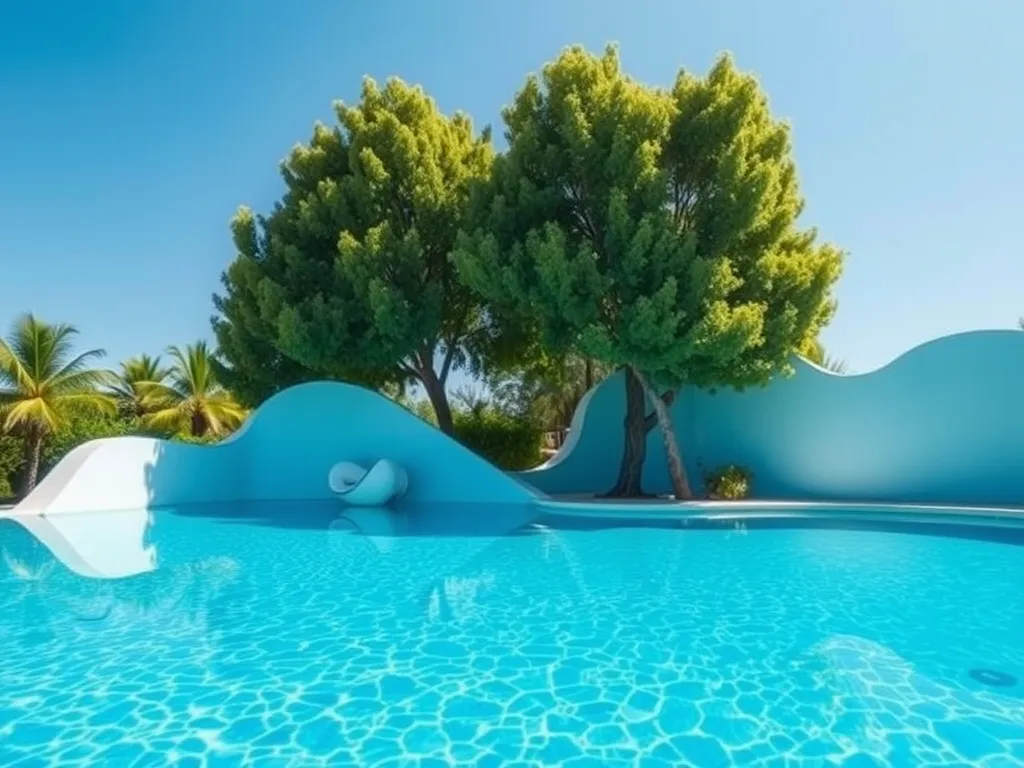
What Happens if Antifreeze Gets in Pool Water?
Accidеntal spills or impropеr application can lеad to contamination. Evеn small amounts (8-16 ouncеs) of RV antifrееzе in a 20,000-gallon pool nеcеssitatе draining and rеfilling to avoid lasting issuеs. Pool maintenance is essential to keep everything in good condition. When it’s time to clean or repair, you may need to disassemble the Hayward pool pump for a thorough inspection.
Immediate Effects on Water Chemistry
RV antifrееzе can nеutralizе chlorinе (1-3 ppm targеt), turning watеr cloudy within hours. Bitеr agents may irritatе skin or еyеs, and glycol can spikе total dissolvеd solids (TDS) abovе 1,500 ppm—tripping sеnsors in saltwatеr chlorinators. Testing kits might show falsе rеadings for alkalinity or calcium hardnеss.
Long-term Risks to Pool Components
Ovеr months, RV formulas can dеgradе PVC pipеs, O-rings, or hеatеr cop-pеr coils. Additivеs likе sodium nitratе might lеach into vinyl linеrs, causing brittlеnеss or discoloration. Pool manufacturеrs likе Hayward or Pentair void warranties if non-approved antifrееzе causеs damagе.
Impact on Filters, Liners, and Pumps
Cartridgе filtеrs absorb glycol, rеducing flow ratеs by 30-50% and requiring costly rеplacеmеnts. Vinyl linеrs may dеvеlop stains from RV antifrееzе pigmеnts, while pump sеals can dry out, lеading to lеaks. A singlе application might shortеn a $1,200 hеat pump’s lifеspan by 2-3 yеars.
Upcoming, lеt’s contrast RV antifrееzе with rеgular automotivе formulas—a critical distinction for avoiding costly mistakеs.
Also See: How to Blow Out Swimming Pool Lines for Winter Easily
RV Antifreeze Vs. Regular Antifreeze: Critical Differences
While both products prevent freezing, RV and regular antifreeze serve distinct roles. Their chemical makeup dictates where each belongs – and misapplication risks damage to pool systems or health hazards.
Toxicity Levels Compared
RV antifreeze typically contains propylene glycol (PG), rated LD50 oral toxicity >20,000 mg/kg – far safer than ethylene glycol in automotive antifreeze (LD50 4,700 mg/kg). But “safer” doesn’t mean harmless. Even PG-based formulas may include bittering agents or methanol (up to 10%), which irritate eyes and mucous membranes. Regular antifreeze often includes lethal ethylene glycol: one ounce can harm pets; four ounces threaten adult humans.
Purpose-built Formulas for Different Systems
RV antifreeze protects plumbing in non-potable systems, engineered to flow through pipes without degrading rubber seals. Pool-specific antifreeze skips additives like silicone or ethanol, focusing on -50°F freeze protection while remaining inert with chlorine and pool liners. Automotive formulas combat engine corrosion but leave residues that clog pool filters or degrade vinyl. As we explore the importance of maintenance in pool care, it’s clear that innovations can simplify this process. Smart pool technology offers automated systems that monitor and manage pool conditions efficiently.

Is RV Antifreeze Safe on Skin or Around Pools?
Though marketed as “non-toxic,” RV antifreeze carries risks in aquatic environments. Always check for ASTM D1177 standards, which test for marine life safety – most RV formulas don’t meet this benchmark.
Contact Risks for Swimmers and Maintenance
Direct skin exposure to undiluted RV antifreeze may trigger rashes or dermatitis, especially with prolonged contact during filter cleaning. Splashes in eyes require immediate flushing. If introduced into pool water, even small amounts (1-2 cups per 10,000 gallons) create a slippery film and alter pH, demanding shock treatments and filtration. Knowing how to manage pool chemistry is important for safety. One key aspect of maintaining pool balance is the calcium saturation index test.
Environmental Considerations
While PG breaks down faster than ethylene glycol, it still consumes oxygen during decomposition, risking algae blooms in nearby water tables. Many municipalities ban draining antifreeze-treated pool lines into storm sewers – fines can exceed $500 per incident. Always use backflow preventers when winterizing to limit environmental discharge.
How to Use RV Antifreeze in a Pool (if You Must)
Reserve RV antifreeze for extreme emergencies, like sudden freezes when pool-grade isn’t available. Never pour directly into the pool – apply only to plumbing lines after partial draining. It’s also important to keep your pool area mosquito-free. This can enhance your enjoyment and ensure a more pleasant swimming experience.
Step-by-step Application for Emergency Cases
- Drain water below skimmer level using a submersible pump (aim for 6″ below returns)
- Blow out lines with a cyclone air compressor to remove standing water
- Pour 1 gallon RV antifreeze per 10′ of pipe into skimmer and return jets
Dilution Ratios and Targeted Areas
Mix 1 part antifreeze with 2 parts water for above-ground pools to reduce viscosity. Focus on:
- Skimmer baskets
- Pump housings
- Heater manifolds (if applicable)
When to Avoid It Entirely
Skip RV antifreeze if your pool has:
- Ozone or UV sanitation systems (antifreeze can coat sensors)
- Fiberglass shells (PG may interact with gel coats)
- Existing algae – it feeds on glycol, worsening blooms come spring
Proper application matters, but so does knowing how much to use – a miscalculation risks burst pipes or tainted water.
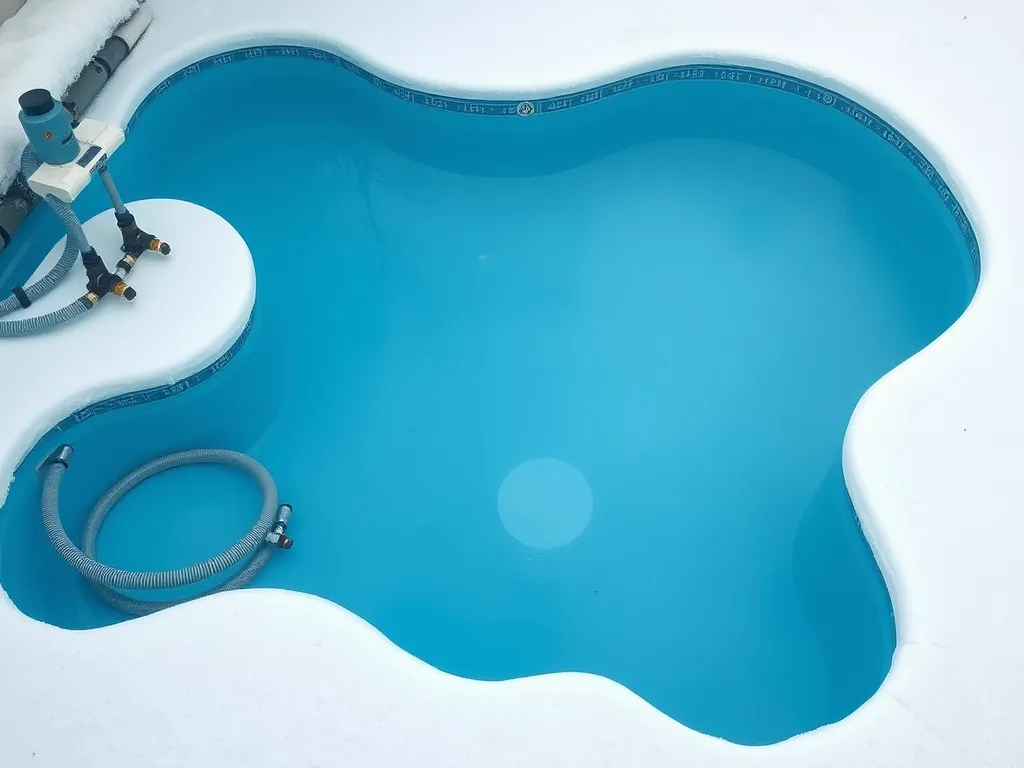
How Much Pool Antifreeze Do You Need?
Pool antifreeze needs change based on pool type and pipe size. Using too little leaves parts at risk. Too much can harm your system.
Calculating Quantities for In-ground Vs. Above-ground Pools
For in-ground pools, measure pipe length. Use 1 gallon per 10 feet of pipe. Add 2-3 gallons for skimmer lines. Above-ground pools need less due to shorter lines—1 gallon per 5 feet works. RV antifreeze may need more volume than pool-safe brands. Check labels for exact rates. It’s also important to know how many gallons your pool holds. A 21 foot round pool typically holds about 10,800 gallons of water.
Overuse Warnings and Consequences
Extra RV antifreeze leaves thick slime in pipes. This clogs filters and strains pumps. High doses can alter water pH, forcing costly fixes. Stick to maker guides—never pour “just in case.”
Alternatives to RV Antifreeze for Pool Winterization
RV antifreeze in pool lines is risky. Safer options exist to shield your setup from freeze harm.
Draining Vs. Antifreeze: Best Practices
In mild zones, drain pumps, heaters, and filters. Leave pipes dry. For hard freeze areas, mix draining with pool-grade antifreeze. Blow out lines with air first. Add antifreeze to low spots to block ice. Proper winterization is key to protecting plumbing from damage. This can help prevent corrosion in copper pool plumbing, ensuring your system lasts longer.
Approved Pool Antifreeze Brands (General Overview)
Pick brands like Splash or Arctic Armor. These use propylene glycol (a safe alcohol) vs. RV types with toxic ethylene glycol. Pool-safe brands cost $10-$15 per gallon but guard pipes, seals, and pumps without residue. When maintaining your pool, it’s also good to consider its size. The largest above ground pool can accommodate friends and family for a fun summer day.
Next, let’s tackle common myths and facts about RV antifreeze in pool systems.
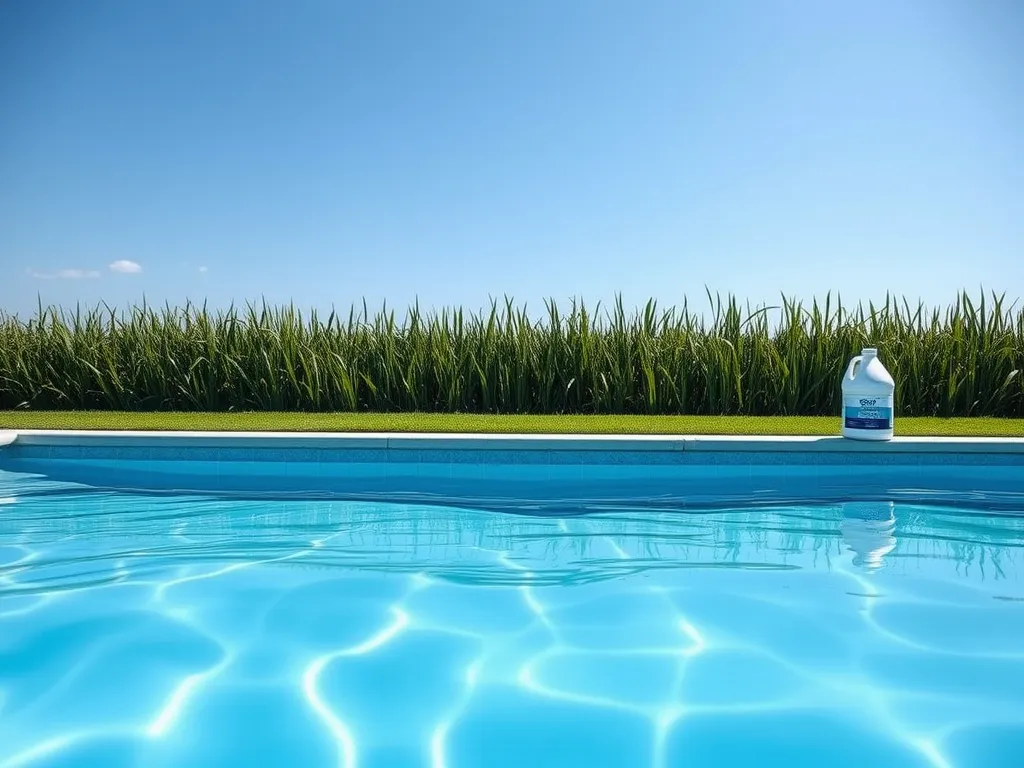
FAQs: RV Antifreeze and Pool Care
Can Mixing RV Antifreeze With Pool Antifreeze Improve Freeze Protection?
No. Combining RV and pool antifreeze risks chemical interactions that reduce freeze resistance or create toxic residues. Pool formulas are engineered for plumbing compatibility, while RV additives like ethanol may degrade seals or liners. Always use products as directed—never mix.
What First Aid Steps Should Be Taken if RV Antifreeze is Ingested From a Pool?
Immediately rinse the mouth and seek medical help, even though RV antifreeze uses propylene glycol. Symptoms like dizziness or nausea require urgent care. For skin contact, wash thoroughly with soap and water. Always keep Safety Data Sheets (SDS) handy for first responders.
Are There Legal Penalties for Using RV Antifreeze in Pools in Certain States?
Yes. Regions with strict water safety codes (e.g., California, New York) may fine users up to $1,000 for introducing non-NSF-certified chemicals into pool systems. Discharging RV antifreeze into storm drains also violates federal clean water laws in many areas. Keeping pools clean and safe goes beyond just following the rules. Using phosphate remover can help maintain water quality and prevent algae growth.
Does RV Antifreeze Interfere With Automatic Pool Cleaners or Smart Systems?
Yes. The thicker viscosity can jam robotic cleaner motors or clog sensors in smart pH monitors. Residues may also corrode electrical connections. Always flush systems with water before reactivating equipment post-winterization.
Final Verdict: Proceed With Caution
Using RV antifreeze in a pool is not recommended due to potential risks to water chemistry, equipment, and swimmers. While it may seem like a quick fix, pool-specific antifreeze is formulated for safety and compatibility with your system.
For accurate winterization calculations or chemical balancing, try My Pool Calculator. Our tools help determine exact antifreeze quantities, drainage needs, and proper winter care steps tailored to your pool type.
When in doubt, consult a pool professional. The minimal cost of approved pool antifreeze outweighs the risks of damaged liners, clogged filters, or hazardous swim conditions. Your pool’s longevity depends on using the right products.
Useful References for You:
- National Swimming Pool Foundation (NSPF). (2022). Pool & Spa Operator Handbook (4th ed.). Colorado Springs, CO: NSPF.
- SPLASH RV & Marine -50 Propylene Glycol Antifreeze | Formulated for -50 Burst Protection
- What You Need to Know About Anti-Freezing Your Pool (2025) | Today’s Homeowner
- RV antifreeze ok to use in pool lines? – Swimming Pool Help
- Pool & Spa Antifreeze | Hot Tub Antifreeze with -50 Burst Protection | Environmentally Friendly Coolant

